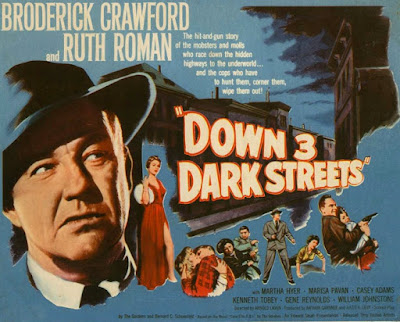One
might dismiss the sleazy screenplay by Dwight Swain, but dismissing
the music score by Lawrence Fisher is impossible. It is the single
worst element of this film. The music supporting an oil derrick
pounding away in the opening is totally misplaced for an intense
drama. Some sections flit from an Oklahoma hoedown to an
early Hal Roach film, to schizophrenic terror. The score can be defined as the worst example of
leitmotifs. Added annoyance is a sound quality suggesting the score
surely was lifted from a decades-old source played by amateur
musicians. In an unabashed attempt to copy Bernard Herrman's Psycho
score, frantic, dissonant strings accompany an over-the-shoulder
camera closeup of Beverly Garland driving a 1960 Buick. Competent
performances aside, the film is an ugly account even without a score.
Kenneth
Tobey—the boss—is up to his knees in Oklahoma crude. A former
business rival of Homeier, they have had a long-standing hate
relationship. The single, cryptic opening voice-over does not quite
divulge this. Tobey is empathetic to Garland's marriage and has
come to her aide on more than one occasion. Jealousy runs deep in
Homeier's veins and he demands she stop working for Tobey. Never mind
that he is on the verge of being fired and currently bringing in
little income. Garland tries to stick with her disturbed husband
which few moviegoers can figure. She feels it is her wifely duty to locate the disappearing skunk nevertheless. But she cannot. The script salaciously places
her into some unlikely, personally dangerous and spooky situations in
her discovery. Even stumbling upon a nighttime Comanche celebration
dance that could not have been anticipated by her or the audience.
Hitting a low point, the script has her raped by a drunken slob—hired
by the demented Homeier.
The
future of Homeier is of little interest to the moviegoer—indeed
it is never revealed. Viewers can take comfort in the fact that his
marriage is dissolved. She and Tobey enjoy an exhaustive weekend
walking tour of Eureka Springs, Arkansas—through
overlapping scenes of the happy couple accompanied by Fisher's
goofy 1930s serial music. Garland returns to work for Tobey.
He seems to be the right man but he harbors a stark secret.







